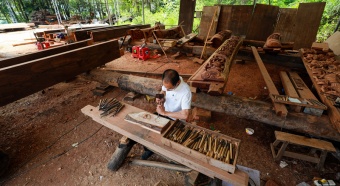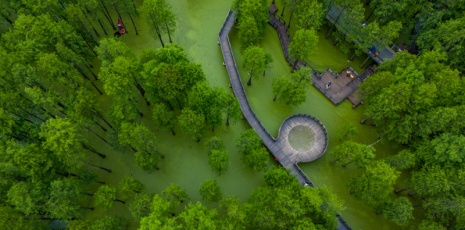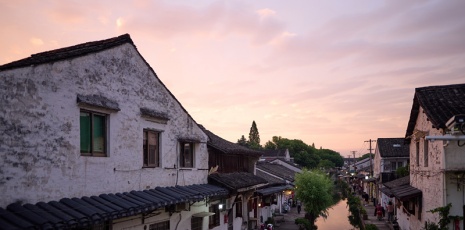Born in 1979, I was almost the same age as the reform and opening-up. If you ask me how the reform and opening-up has changed the lives of the Chinese people, you’re asking the right person, because my life trajectory is synchronized with the reform. As far as I am concerned, the reform has brought tremendous changes to China’s education, and I and those around me are beneficiaries. Over the years, I have often returned to my hometown, the rural area of Anhui Province, witnessing the change of education in our village.
My hometown is Yuantanwan Village, Dushan Town, Lu’an City, Anhui Province, a typical small village in Dabie Mountain. My parents are both farmers, and my grandfather is a retired primary school teacher. When I was a child, my grandfather told me that his greatest expectation for me was to be admitted to a secondary normal school and become a primary school teacher. In this way, with him, my uncle, and me, our family could be honored as “a family of teachers”. “This is incredible, we can become a scholarly family”, he expected.
From the 1980s to the mid-1990s, it was not easy to enter the secondary normal school. As far as I know, among hundreds of people in our whole family, only a cousin who’s two years older than me was admitted to a secondary normal school, and the other eight years older than me was admitted to college. To realize our dream, I studied very hard and got satisfactory grades. To my grandpa’s disappointment, in 1994, I didn’t pass the entrance exam for secondary normal school, but was instead admitted to the county’s No. 2 High School. And to his delight, I entered a key university later and became the first child to seek higher education at another province in our family.
My personal history of learning and struggle is just a microcosm of the family and the village’s history of “education changes destiny”. To be honest, it was relatively difficult to change personal destiny by seeking education in the 1980s. I remember that after graduating from elementary school, we had to pass the entrance exam to get to junior high school. There were more than 100 students in the 5th grade, among them only 20 students were admitted, and most of the rest students went home to do farm works. After graduating from junior high school, we had to take another entrance exam for senior high school, under fierce competition. In the rural areas then, merely 30% of students could go to senior high school, and the rest mostly went out to work. Now it seems that some of the students who could not seek more education then were actually talented, but limited by poor economic conditions and scarce education resources, only the best among the best could be provided with more education. By contrast with the scene of the past, this has been a tremendous progress, as the society has become respectful of knowledge, and known how to use knowledge to change the destiny. In our village where college students were rare, every time they came home, the villagers would say “Xiucai went home”, “College students came back”, and parents were proud and relatives admired.
By the end of the last century, colleges and universities began to expand their enrollment. Every time I returned to the village, I would hear the news of “this child was admitted to college” and “that child went abroad to study”. The number of college students surged in our village. In effect, enrollment expansion of colleges and universities bears a downward effect, that is, the wider the paths to universities, the more the village children who can go to key high schools in urban areas, and the greater the hope of rural children.
The change brought by education to the village is most obvious. In general, a family having a university student would experience improving economic conditions in that parents don’t have to spend money in building a new house for their children, who can feed their parents financially after finding a job. This is also a vivid interpretation of how education changes the destiny.
In the new century, with popularization of education, the focus of our education has begun to shift from quantity to quality. Village students seldom worry about their chances of entering a higher school, but pay more attention to selecting good schools and teachers. Over the years, the primary and junior high school that I have entered had disappeared, and many villagers have moved to towns or urban areas, willing to spend more money sending their children to urban schools. As the quality of national education increases, parents have more choices and economic conditions to prepare a better future for their children.
When I went home for the New Year, the country roads were getting wider and wider, but traffic jam was still there as young people working outside and the people who bought houses in the nearby towns both drove home. Factors for improvement of everyone’s life are numerous, but in my opinion, education plays a vital role. Whether for those who changed their fates by seeking higher education, or who didn’t go to college but learned crafts for doing business, education and knowledge were indispensable. Though villagers keep silent about it, they understand the significance of education, thus cultivating children at all costs.
Many people are now talking about “educational anxiety”, but I think this is actually people’s “increasing demand for higher quality education”. During the 40 years of reform and opening-up, education has changed the destiny of a nation and made it smarter and richer, to which the story of me and my village constitutes one of the best examples. People’s recognition of the significance of children’s education is basically one of the greatest achievements in the 40 years of reform and opening-up. I am grateful to the motherland and to the reform and opening-up, because we are benefiting from it.









